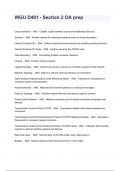Exam (elaborations)
WGU D481 - Section 2 OA prep Exam Questions And Answers All Correct
- Course
- Institution
WGU D481 - Section 2 OA prep Exam Questions And Answers All Correct Circuit-switched - ANS Creates a path between source and destination devices Extranet - ANS Private network for authorized external users to share information Internet Protocol (IP) - ANS Delivers packets across ...
[Show more]



